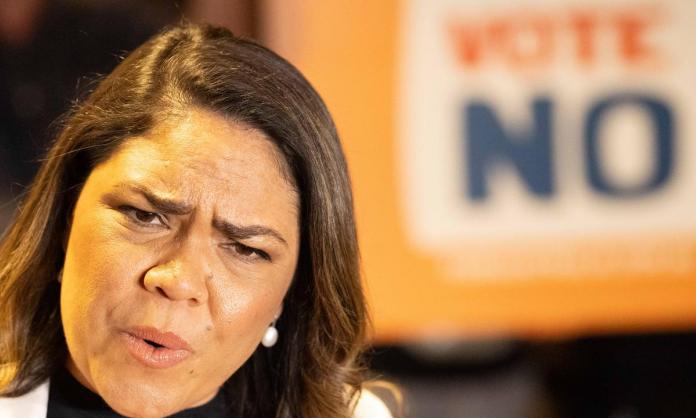Jacinta Nampijinpa Price could well become as synonymous with the far right as Pauline Hanson. Four weeks out from the referendum on the Voice, she cemented her position as one of Australia’s leading white supremacists with her comments at the National Press Club about how colonisation has been a wonderful thing for Aboriginal people. She railed against “separatism” (any acknowledgement that Aboriginal people are oppressed) and implored people to recognise that Aboriginal disadvantage is not due to racism but is the result of something “much closer to home”.
Her fans in the front row—a selection of the Liberals and Nationals’ finest—could not wipe the ghoulish grins off their faces. A cackling Michaelia Cash almost popped a pearl button when Price mocked the idea of intergenerational trauma. Andrew Bolt has since referred to Price’s “stunning speech” as a “turning point” that will “ring through the ages”.
But despite all the excitement and accolades, Price is just the latest in a long line of racists who attack Aboriginal people as welfare cheats and land robbers, and who extol the virtues of colonisation. After all, Australia Day exists to celebrate it. In 2018, Tony Abbott declared:
“What happened on the 26th of January 1788 was, on balance, for everyone—Aboriginal people included—a good thing because it brought Western civilisation to this country, it brought Australia into the modern world.”
Price is making her career on the backs of her forebears in the Liberal Party, National Party, One Nation and the Bennelong Society. Her Aboriginality gives her more licence to spew racist filth; she has become a mouthpiece for things some in her camp are unwilling to say and invites everyone on the right to share in a little joke at the expense of the “woke identity politics left”.
Price is consciously casting herself not just as a conservative, but as a figure of the hard right. She regularly outflanks Warren Mundine (this country’s other most prominent Aboriginal racist), for instance, by vociferously opposing treaty, which he supports. Before becoming a senator, she worked with Mark Latham on a “Save Australia Day” ad. During her first week in parliament, she expressed support for Pauline Hanson storming out during the acknowledgement of country. When Gary Johns recently commented that Aboriginal communities are living in “stupor” and need to “learn English” before they can have a voice, some conservatives distanced themselves—Price endorsed his comments.
One of Price’s favourite topics to discuss is violence within Aboriginal communities, especially towards women and children. She is an outspoken supporter of more policing and state removals of Aboriginal children. These are the “practical solutions” she counterposes to “symbolism”. In 2016, she argued:
“Growing up in and knowing my culture, I know that it is a culture that accepts violence and in many ways desensitises those living the culture to violence ... this becomes very apparent when an evolved culture comes up against a long unchanged culture.”
Weaponising her own experiences of domestic violence to justify white supremacism is something Jacinta learnt from her mother, Bess Price, who became John Howard’s favourite pet during the racist Northern Territory intervention. Bess Price helped implement the military takeover of Aboriginal communities as chair of the Northern Territory Indigenous Affairs Advisory Council. She was rewarded by the Country Liberal Party with a spot in the NT Legislative Assembly from 2012 to 2016, and became minister for community services in the Adam Giles government.
Jacinta Price has similarly been rewarded for her services to racism. She likes to present herself as a grassroots champion of Aboriginal remote communities, as against “inner-city activists”, academics and politicians of the “Canberra bubble”. This is part of her self-styling as a far-right figure.
In truth, Price is a creature of the Canberra bubble. The Country Liberal Party handed her their number one Senate position at the last federal election. As John Faine recently explained in the Guardian, the CLP vote declined by 20 percent in the Northern Territory, and Price’s main constituents are wealthier white voters in urban centres. The same was true in 2019, when Price ran for the Legislative Assembly: she received fewer than 50 votes in remote communities where 500-600 votes were cast.
Peter Dutton promoted Price to shadow minister for Indigenous Australians when he recognised that the Voice referendum was a golden opportunity to reignite and repopularise anti-Aboriginal racism, and a potential step in the Liberal Party’s road back to power. Like conservative and right-wing parties around the world, the Liberals recognise the value of identity politics for their own side.
Opportunism works both ways in this arrangement. Price clearly intends to be a big political figure beyond the referendum. She has stated that she would expect a place on the Voice advisory body if it did exist, and she intends to broaden her right-wing vitriol by taking aim at trans rights. Her consolidation as a leading figure of the hard right could well be one of the lasting legacies of the referendum fiasco.









